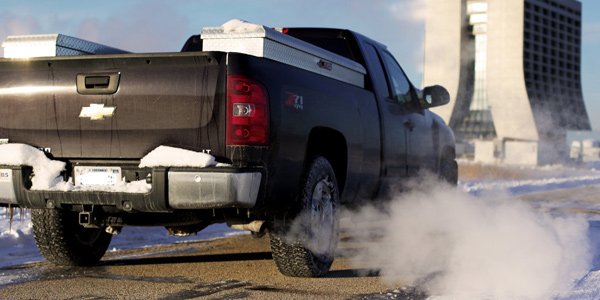
Can Fleet Software Reduce Fuel Use?
Adding up to $90 billion in 2016, diesel fuel is the second biggest cost for fleets, after drivers themselves. It’s also the easiest cost to trim, thanks to a handful of inefficiencies that cost commercial motor vehicles in the US billions in waste every year. Fortunately, fleet software can reduce fuel use. Before we get into the solution, let’s check out some of the habits that are making your fleet waste fuel – and how much that can cost you.
Annual fuel use averages will depend on the type of vehicle. At 11,242 gasoline gallon equivalent (GGE), transit buses average the most fuel used per year, closely followed by Class 8 trucks at a yearly average of 10,739 GGE, according to U.S. Department of Energy data.
So, what exactly contributes to higher fuel costs? And how much wasted fuel can a fleet manager realistically cut down on, to reduce their overall fleet management costs? These are the top ways trucks will waste fuel –and money– in 2020 and beyond.
Speeding
According to the American Trucking Associations (ATA), a commercial truck driving at 75 mph uses up 27% more fuel than one travelling at 65 mph, thanks to stronger wind resistance. The cost of this extra fuel burn adds up fast – much faster than any saving a truck might make by driving at a higher speed. For example, over a distance of 50 miles, that 10mph increase from 65 mph to 75 mph will only save a driver 6 minutes and 9 seconds.

A fleet that wants to save fuel can choose to monitor its drivers’ speeding habits through fleet management software (FMS) with GPS tracking. Of course, fast speeds can be unavoidable when following the flow of traffic, but figuring out a healthy target speed can still account for the majority of that 27% in fuel savings.
Harsh Braking/Accelerating
After speeding, the next biggest fuel waster is stop-and-go braking and accelerating. Once again, this fuel waste isn’t entirely avoidable, as both traffic congestion and hilly regions will naturally have drivers’ feet reaching for the brake more often. However, researchers at the Department of Energy’s Oak Ridge National Laboratory estimate the impact of harsh driving on fuel economy to be between 15% and 30%.

Harsh driving can be tracked with the accelerometer in an FMS hardware unit. Using cruise control (when possible) can also cut down on excessive starts and stops.
Idling
While excessive idling isn’t as bad as speeding or harsh braking, it still wastes gas to the tune of between a quarter and a half gallon per hour, depending on engine size and A/C use. The solution is easy: Shut off your engine when your vehicle isn’t in motion. Starting the engine only uses 10 seconds’ worth of fuel, as the Argonne National Laboratory found in 2015. In other words, if your vehicle won’t be moving within the next ten seconds, you’ll cut fuel use by turning it off. The practice can boost fuel economy by 4–5%, one guide from the Department of Energy notes.
Once again, an FMS can track idling times, letting managers know when their fleet might be able to cut back.

How to Reduce Fuel Use in Your Fleet
There are many other ways to improve a vehicle’s miles per gallon, from changing the weight of cargo to A/C use to proper tire inflation. However, the EPA has identified the three issues listed above as the biggest needle-movers for avoiding excess fuel use.
It’s difficult to put a hard number on the amount of fuel any given vehicle could avoid using in a year. Factors like the ratio of highway driving to stop-and-go traffic can be tough to estimate, while regional topography can’t be avoided.
However, by combining the varying ways a fleet management system can improve its fuel efficiency – including the three main methods outlined above – the average vehicle can reduce fuel waste by a minimum of 10%, and by as much as 30% in a given year.
Here’s what that percentage looks like as potential annual cost savings for eight different types of vehicle, given their average annual fuel use in GGEs (and assuming a national average gas price of $2.56/gallon):
Or, to put it another way, this is how much each type of vehicle will waste in 2020, on unnecessary fuel, by not using an FMS.
The Numbers Are In: Fleet Software Reduces Fuel Use
Without the savings an FMS has to offer, the average Class 8 Truck costs $27,491.84 to fuel up over the course of a year. By simply accounting for the top three biggest fuel wasters (speeding, idling, and harsh braking/accelerating), that same truck’s fuel only costs $19,244.29 across an entire year — saving a fleet of them almost $8,250 per vehicle. For a fleet of 50 trucks, that adds up to an annual wastage – or savings – of over $412,000 on fuel alone. That’s a huge return on investment that shows how fleet software can reduce fuel usage. As you can see, if used properly, a fleet management system can pay for itself many times over, in terms of the fuel saved – all while improving security and operational efficiency.
More Benefits of Fleet Software*
One of the biggest benefits of fleet software is how it can help employees. It can exonerate them from traffic violations, prove that they got their work done, and cut down dramatically on their paperwork. Those are just a few of the benefits organizations notice when switching to fleet software.
Organizations can also safeguard their brand using fleet software. Think of every vehicle in your fleet as a billboard that advertises your organization to the entire community. Without a fleet management solution, your community could conclude that you don’t care about how your drivers behave on the roads and the effect on the general public. And imagine if they see one of your vehicles involved in a crash.
On the other hand, drivers that have the benefit of coaching and actionable feedback can put your organization’s best foot forward. And then there’s pollution. More and more fleets are making the effort to go green. But how can you get cleaner and greener if you don’t have fuel use data? With fleet management systems in place, you’ll be able to identify steps that will use less fuel and lower your carbon footprint. Besides lowering your speeds, there’s also reduced idle times and more-efficient route planning. With more and more consumers preferring to do business with companies that commit to sustainability, this is a great aspect to fleet management software.
Adam is a writer at Tech.co and has worked as a tech writer, blogger and copy editor for the last decade, recently specializing in Asset and Vehicle Tracking business technology. He’s also a Forbes Contributor on the publishing industry (and Digital Book World 2018 award finalist) and has appeared in publications including Popular Mechanics and IDG Connect. When not glued to TechMeme, he loves obsessing over 1970s sci-fi art.
*Information provided by GPS Insight.





